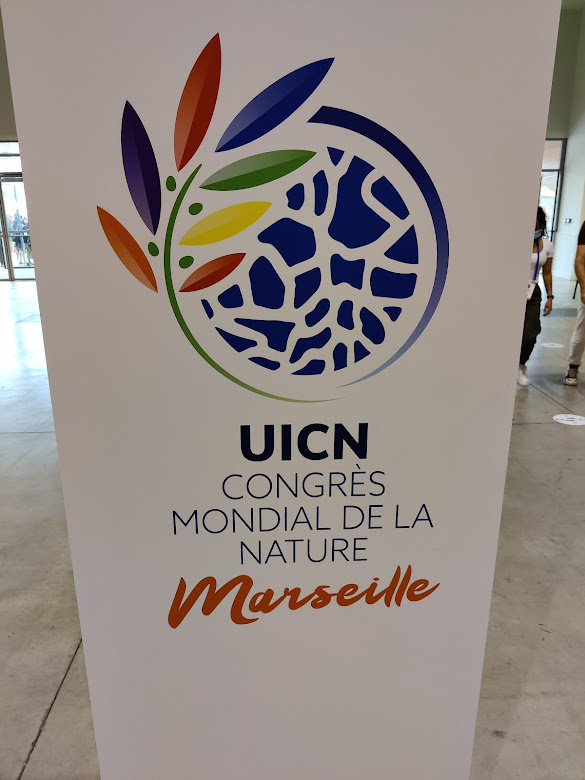The Indian National Maritime Foundation and the EU project ESIWA (Enhancing Security Cooperation In and With Asia) held an online EU-India seminar on maritime security and UNCLOS on April 11th. The key question addressed was how India and the EU can cooperate better to provide maritime security in the Indo-Pacific. I had the pleasure to chair the second session of the event.
Category Archives: In the field
SafeSeas visit to Lisbon
The SafeSeas team held meetings with partners in Lisbon on the 1st and 2nd of March. We first had a meeting with the Atlantic Center a key new knowledge production and capacity building initiative of Portugal’s Ministry of Defense. SafeSeas is in the process of forming a partnership with the Center to discuss strategic issues, such as subsea infrastructures, but also to work together in capacity building and the maritime security academy. We also visited the Maritime Operations Center of the Portuguese Navy which is the country’s maritime domain awareness center that integrates and coordinates search and rescue, border, police and other maritime functions.
In the afternoon we visited the European Maritime Safety Agency (EMSA) headquarter. We received a briefing on EMSA’s surveillance work and how it uses satellite data and discussed the future of the agency in the EU’s overall maritime governance architecture. We also met with the UNODC’s Global Maritime Crime Programme’s local representative.
Presentation at SHADE Meeting
SHADE – an acronym for Shared Awareness and Deconfliction — is the key forum in which the activities of navies in the Western Ocean are coordinated. Originating in the response to Somali piracy, SHADE know has a wider outlook on maritime crime and naval activities.
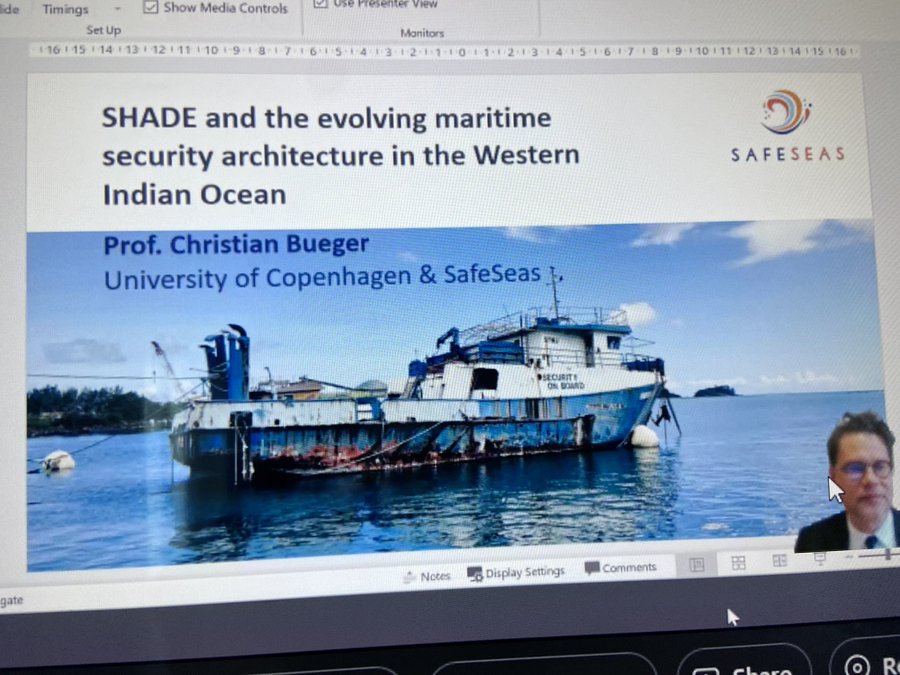
On the 2nd of February, SHADE held its 49th meeting, and I had the pleasure to address the participants. In my short presentation, I investigated the current and future role of the forum in the maritime security architecture of the Western Indian Ocean. I argued that SHADE is becoming more and more important because of the growing insecurity in the region as well as new naval activities which are geopolitically motivated and for instance linked to the rise of the Indo-Pacific as a geo-strategic region. SHADE will be important as a way out of the militarization dilemma in the region, to complement the diplomatic work of the Contact Group on Piracy off the Coast of Somalia, but also to address future tasks related to e.g. maritime accident responses.
Small Island State Foreign Policy – talk at Seychelles MFA
What are the opportunities and challenges for small island state foreign policy in the changing world political environment? This was the key question that I explored at a talk at the Ministry of Foreign Affairs of the Republic of Seychelles on the 20th of December. The event was hosted by the minister who gave a short welcome address.
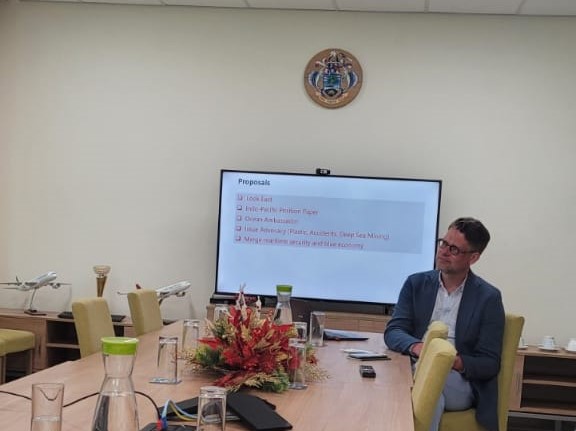
In my talk I started in revisiting an article on the Seychelles co-authored with Anders Wivel. In the article we explored how Seychelles has managed to gain a global reputation and status despites its very low capacity. As we argued this can be explained by the ways that the country adopts productively the principles of smart small state foreign policy and by its style of diplomacy of diplomacy driven by pluralism and pragmatism – what we dubbed ‘creole diplomacy’.
On this basis, I discussed current world political master trends that are likely to influence the status and diplomatic action space of Seychelles, emphasizing 1) the return of geopolitics, in particular given the rise of Indo-Pacific thinking, 2) the rise of informal governance and 3) the ocean revolution. Each of these trends creates new challenges and opportunities. The analysis is forthcoming as a short article in the Seychelles Research Journal.
Based on this analysis I made five proposals for how Seychelles can seize opportunities and continue its entrepreneurial style of diplomacy. Firstly, Seychelles should look east and strengthen its bilateral relations to Maldives and Sri Lanka, but also seize opportunities to work closer with Southeast Asia and the islands of the South Pacific.
Second, the government would benefit from issuing a paper in which it outlines its own understanding of the Indo-Pacific, the role of Seychelles therein, and its vision for the future of this regional construct.
Thirdly, the country could benefit from better coordinating its ocean-related diplomacy under the notion of ‘blue diplomacy’. This could entail the creation of the post of an ocean ambassador who coordinates participation in ocean summits, adds a face to Seychelles ocean politics and speaks on behalf of Seychellois marine life.
Fourthly, I argued for the need to continue strong advocacy and campaigning work on core ocean issues. This could particularly focus on three issues: Plastic pollution and the global campaign against plastics; the prevention of and response to shipping accidents, that requires more surveillance of shipping activities but also capacity building on a regional level; and supporting the ban of deep sea mineral mining.
Fifthly, I suggested that Seychelles can draw on its reputation as an innovator in developing the blue economy and maritime security agendas to drive forward the discussion of how synergies between both can be build.
The event continued with a discussion of creole diplomacy, the implications of the Indo-Pacific construct for Seychelles and which issues the foreign policy might want to focus on.
Field visit to Seychelles
From the 15th to 23rd of Decemberr I will be visiting Seychelles. During my visit I will meet with stakeholders concerning ocean governance in Seychellois waters as well as the region. I will also give a talk to the ministry of foreign affairs on smart small island state foreign policy and the Indo-Pacific.
IUCN World Conservation Congress in Marseille
I am back from a short visit to Marseille where I had the pleasure to visit the IUCN World Conservation Congress. It was great to see so much attention for the state of the oceans and to learn about ongoing and planned conservation projects. The support for the moratorium on deep sea bed mining and the call for a reform of the International Seabed Authority was one of the important outcomes.
It was also great to learn about the “Great Blue Wall” Initiative which will be an important experiment in regional integration to follow over the coming years. Most certainly regional integration is part of the answer, but we shouldn’t forget the importance of national capacity and local expertise as these initiatives unfold.
The Congress left me with two thoughts. IUCN is a world of enthusiasm and hope that indeed the oceans can be better protected. What I missed is perhaps a bit more pragmatism. ‘Blue economy’ and ‘blue finance’ – ocean science driven, new planning and innovative finance models – are ambiguous concepts. Some of the initiatives appear to be a continuation of technocratic planning models or liberal market dreams.
It seems that the question of distributive justice, how the costs, risks and revenues are distributed (blue justice!) does get too little attention. While the world most certainly needs blue economy entrepreneurs, some more caution for counter-intuitive consequence and the impact on communities would be welcome.
The congress also showed how far apart the worlds of ocean conservation and maritime security are. Those interested and in charge for maritime security meet at very different sites than the conversation community. There is little crossover or dialogue.
The gap continues to puzzle me. Isn’t it obvious that protected areas require agencies that ‘protect’ and enforce regulations? We will need marine rangers, coast guards and navies to do this job. And isn’t it obvious that the most immediate threats to marine biodiversity come from environmental crimes such as illegal fishing or deliberate pollution, or shipping accidents and oil spills as we could witness in Mauritius and Sri Lanka in the last year?
Better integrating the different ocean agendas – maritime security, blue economy, blue justice – will be one of the key challenges in the year to come. It would be great news if the next IUCN Congress or one of the several upcoming international ocean conferences would send a signal in this regards.
What is the state of the EU’s maritime security strategy?
The Portuguese presidency of the Council of the EU has made quite some efforts to lift maritime security higher on the agenda of the EU. To reflect on the state of EU maritime security provision, Portugal organized a mini away day of the EU Military Committee on 2 June 2021.
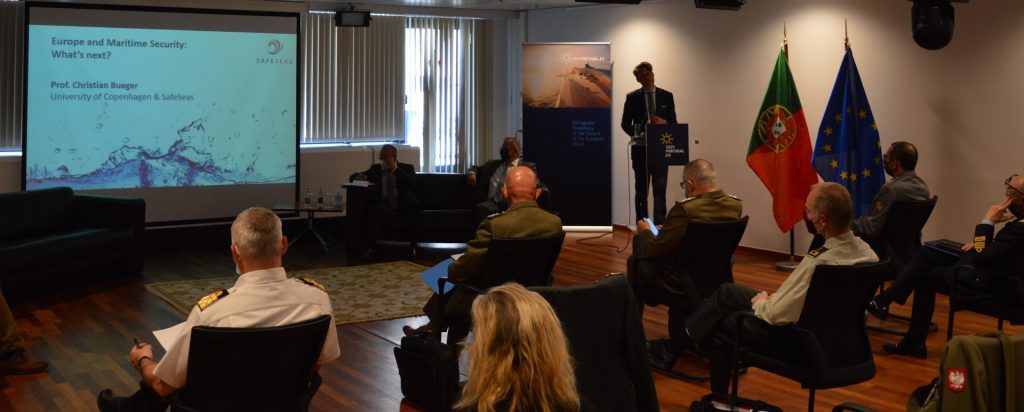
I had the pleasure to speak at the event alongside the keynote speaker Mr Kitack Lim, Secretary General of the International Maritime Organization, and the Portuguese Special Representative for Maritime Security in the Gulf of Guinea.
In my talk I reviewed the current strategy choices of the EU. I highlighted a number of current challenges, which includes in what kind of command structures the EU operates abroad to address piracy and other blue crimes, the relationship to NATO’s work on maritime security, and the issues linked to the Brexit process.
I also argued for the need to pay more attention to arising matters, including the environmental security agenda at sea, the consequences of climate change, and the importance of subsea data cables.
I concluded in suggesting to revisit the EU Maritime Security Strategy and calling for an open dialogue with NATO on the matter.
Attending SHADE: The key military coordination mechanism in the Western Indian Ocean
The Shared Awareness and Deconfliction (SHADE) mechanism is a brainchild of the responses to piracy off the coast of Somalia. It is the key instrument through which the various navies coordinate each others activities and arrange for the International Coordinated Transit Corridor, and convoys and patrols in the Western Indian Ocean region. It is also the main mechanism through which the transport industry and navies collaborate on a strategic level. The successful coordination in SHADE is one of the key factors explaining the decline of Somali piracy.

On the 27th of May, the 48th SHADE meeting took place as usually held in Bahrain. This time it was complemented by an online participation platform through which I had the honor to address the participants.
At the meeting, I presented some of the key insights from the SafeSeas survey of regional maritime security alignments in the Indo Pacific. I provided an overview and emphasized that institutional proliferation is problematic. In consequence, SHADE must ask how it sits in this environment, and how it wants to continue its work in the long run.
This is ever more important as SHADE in the meantime is a platform for discussing various maritime security issues. As reflected in the presentations at the meeting this includes, illegal fishing, smuggling, or the security situations around the Yemeni coast and Strait of Hormuz.
Presentation at NATO Maritime Security Conference
What are the consequences of the Anthropocene for maritime security? How will climate change and heigthened awareness for marine conservation impact blue crimes and the work of maritime security forces?
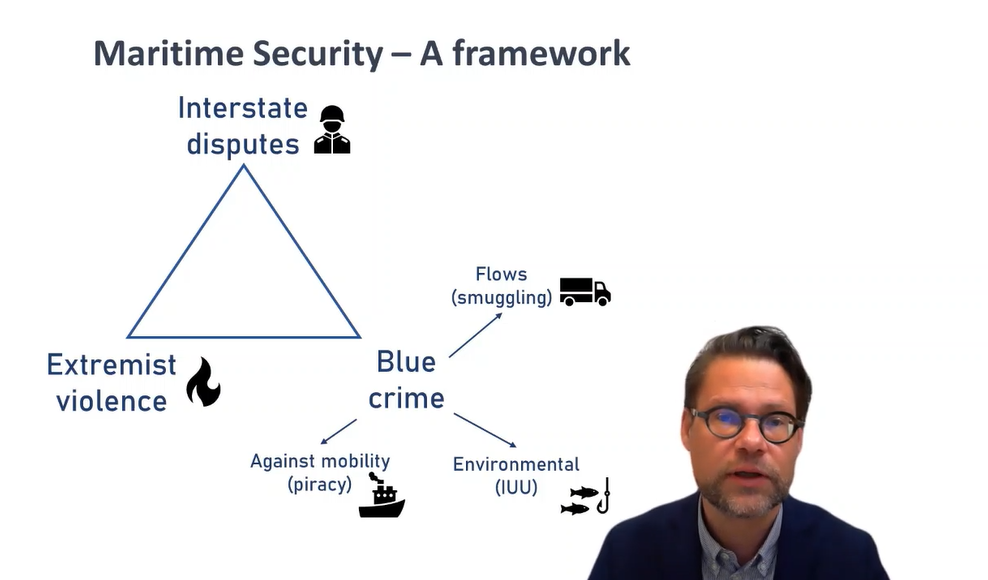
These are the questions that I address in a talk given at the NATO Maritime Security Centre of Excellence 2020 conference on September 16th.
Presentation at African Maritime Collaborative Working Group
On July 16th I had the pleasure to give a presentation on our our new project AMARIS to the African Maritime Collaborative Working Group by the US government. The group seeks to gather the US government’s “African Maritime Community of Interest in an open thought-provoking environment, […] to better enable US participation in African and worldwide maritime Domain Integration and Security Awareness.”
In the presentation I set out the core objectives of AMARIS for understanding the maritime security situation in Ghana, and what broader lessons can be gained from it. I particularly highlighted the potential of our training school to form a sustainable network of maritime security analysts.
